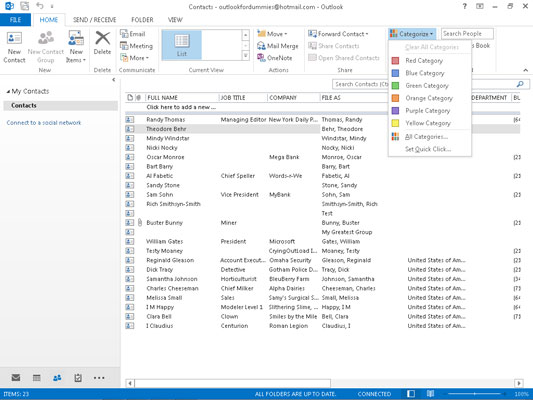The Categories feature in Outlook is designed to help you tell what’s urgent from what can wait. There’s a lot of value in a good collection of information. However, you can’t squeeze full value from a list of contacts or tasks if you can’t get a quick handle on which items are important and which aren’t.
Assign a category in Outlook 2013
When you first set up Outlook, you can find out what categories are available by clicking the Categorize button on the Home tab. The Categorize button looks like a small, multicolored tic-tac-toe square. Several other Outlook modules also show the Categorize button; it does the same job wherever you find it.
Clicking the Categorize button opens a list of (surprise!) categories, each named after a color. If you simply want to color-code your items from the default, the process is pretty simple.

Follow these steps to assign a category to an item:
Click the item you want to categorize.
The item is highlighted.
Click the Categorize button and choose from the list.
A colored block appears in the item to indicate which category you chose.
You can assign multiple categories to each item, although putting too many on an item may be more confusing than assigning no categories at all.
Rename a category in Outlook
You can memorize what each Outlook category color means if you like, but it probably would be easier to rename categories to specific colors:
Click the Categorize button and choose All Categories.
The Color Categories dialog box appears.
Click the category you want to rename.
The category you select is highlighted.
Click Rename.
The category you chose is surrounded by a box to show that you can edit it.
Type the new name you want to assign to that category.
The name you type appears in place of the old name.
Click OK.
The Color Categories dialog box closes.
If you change the name of a category that you had already assigned to some Outlook items, that category name changes on those items automatically.
Change a category color in Outlook
You can change the color of a category as well as its name. Assigning memorable colors can give important clues about how your work is going or how well you’re keeping up with current projects.
Follow these steps to change the color of a category:
Click the Categorize button and choose All Categories.
The Color Categories dialog box appears.
Click the category to which you want to assign a new color.
The category you select is highlighted.
Click the Color button.
A drop-down box appears, showing the colors you can choose.
Click the color you want to assign.
The color you chose appears in place of the old color.
Click OK.
The Color Categories dialog box closes.
You can choose None and create a colorless category. That’s kind of drab, but if it fits your mood, go for it. One possible reason for creating colorless categories is that Outlook only offers 25 colors, and you may have more than 25 categories. But after you get past 25 categories, you might consider cutting down on the number of categories to reduce confusion.
Assign a category shortcut key in Outlook
You can give each category a shortcut key, which allows you to assign a category without touching your mouse. That’s very handy when you want to zoom through a screen full of e-mail messages or tasks and set everything into some kind of order.
To assign a shortcut key to a category, follow these steps:
Click the Categorize button and choose All Categories.
The Color Categories dialog box appears.
Click the category to which you want to assign a shortcut key.
The category you select is highlighted to show that you selected it.
Click the Shortcut Key menu.
The list of shortcut keys appears.
Click the shortcut key you want to assign.
The name of the shortcut key you chose appears to the right of the category.
Click OK.
You can’t assign more than one shortcut key to a category; that would be confusing. However, you can assign more than one category to an item.





